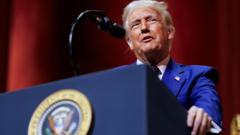Sinn Féin's recent decision to boycott the White House St. Patrick's Day celebrations is a daring political maneuver that could reshape their relationship with key US figures. This snub comes in response to recent aggressive statements made by Donald Trump regarding both Ukraine's President Volodymyr Zelensky and the Palestinian situation in Gaza. By opting out of the traditional celebrations that Northern Ireland's first and deputy first ministers typically attend, Sinn Féin risks alienating segments of the Irish diaspora that have affirmed their support for Trump.
The political calculus behind Sinn Féin's boycott aligns with growing public dissent over Trump's remarks, which included proposing drastic changes to US policy in the Middle East, such as transforming Gaza into a luxurious tourist hub. This proposition faced widespread condemnation from international leaders, including German and French officials, alongside urgent warnings from United Nations Secretary-General António Guterres against potential ethnic cleansing in the region. Trump's unfounded accusations labeling Zelensky as a "dictator" have only added to the outrage.
The timing of the boycott is significant, especially as the Sinn Féin leadership sees it as aligning with public sentiment regarding Trump’s remarks. However, this decision could backfire, threatening established political alliances in the US. The announcement was made while sitting in Dublin, potentially construed by unionist rivals as originating from outside Northern Ireland, which may amplify tensions domestically.
As the event nears, all eyes will be on Deputy First Minister Emma Little-Pengelly, who is still interested in attending the St. Patrick's Day celebrations in Washington. If she goes, it would mean Northern Ireland would have representation but in a fragmented manner, devoid of a united front from the joint ministerial office. This unfolding scenario highlights Sinn Féin's delicate balancing act in a divided political landscape.
The political calculus behind Sinn Féin's boycott aligns with growing public dissent over Trump's remarks, which included proposing drastic changes to US policy in the Middle East, such as transforming Gaza into a luxurious tourist hub. This proposition faced widespread condemnation from international leaders, including German and French officials, alongside urgent warnings from United Nations Secretary-General António Guterres against potential ethnic cleansing in the region. Trump's unfounded accusations labeling Zelensky as a "dictator" have only added to the outrage.
The timing of the boycott is significant, especially as the Sinn Féin leadership sees it as aligning with public sentiment regarding Trump’s remarks. However, this decision could backfire, threatening established political alliances in the US. The announcement was made while sitting in Dublin, potentially construed by unionist rivals as originating from outside Northern Ireland, which may amplify tensions domestically.
As the event nears, all eyes will be on Deputy First Minister Emma Little-Pengelly, who is still interested in attending the St. Patrick's Day celebrations in Washington. If she goes, it would mean Northern Ireland would have representation but in a fragmented manner, devoid of a united front from the joint ministerial office. This unfolding scenario highlights Sinn Féin's delicate balancing act in a divided political landscape.



















